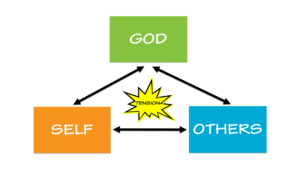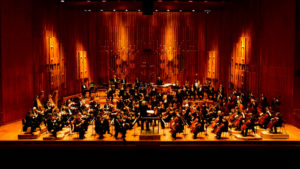If you are breathing, have a pulse, and are engaging the world around you at all, it should be clear that we are living in very divisive, polarizing times. Almost every issue, event, leader have people drawing up battle lines, with everyone split between the “two sides.” of whatever is being discussed.
Very rarely are people willing to give any ground on any points of disagreement. You typically are either for us or against us, and there is little middle ground. The truth is the truth. And you either have it or you don’t.
I recently re-read a story told of Jesus that reminded me of this issue. Whether you consider yourself a follower of Jesus in the spiritual sense or not, most of the world believes that a person named Jesus lived about 2,000 years ago and that he was a very wise, spiritual teacher.
In this particular story, a question comes to Jesus from a religion scholar at the time, which one of the commandments is the most important? Please read the short story as told by “The Message” translation of the bible, from Mark 12:28-34 –
One of the religion scholars came up. Hearing the lively exchanges of question and answer and seeing how sharp Jesus was in his answers, he put in his question: “Which is most important of all the commandments?”
Jesus said, “The first in importance is, ‘Listen, Israel: The Lord your God is one; so love the Lord God with all your passion and prayer and intelligence and energy.’ And here is the second: ‘Love others as well as you love yourself.’ There is no other commandment that ranks with these.”
The religion scholar said, “A wonderful answer, Teacher! So lucid and accurate—that God is one and there is no other. And loving him with all passion and intelligence and energy, and loving others as well as you love yourself. Why, that’s better than all offerings and sacrifices put together!”
When Jesus realized how insightful he was, he said, “You’re almost there, right on the border of God’s kingdom.”
Right off the bat, I realize that the initial question was flawed. When the religion scholar asked, which ONE of the commandments is most important, that question assumed that there is, actually only ONE that is most important. Jesus, did not answer the specific question that was asked – because it was a question formulated with an assumption about what the answer would be.
Jesus, as he often did, re-framed the question, and answered the real question, behind the original question – the unbiased version of the original question. Jesus shares not one, but two commandments. As I read the story more closely, I have come to realize that Jesus is actually setting up a TENSION as it were, between not two, but actually three specific areas.
When Jesus admonishes us to love others as well as we love ourselves, it is safe to assume that Jesus desires for us to love others well. The implication there is, that we need to love ourselves well.
Of course, if we are to love God with all of our passion, energy, etc., we would have none left for others or ourselves. I believe that Jesus is intentionally setting up this tension. He is asking us to make three distinctly different things the MAIN thing – which is – impossible in the most pragmatic sense of the word.
We could think of it as creating a static balance between the three. I am to focus on God ⅓ of the day, others ⅓ of the day, and myself, ⅓ of the day. While that is simple, and I wish it were that easy, the truth is, life is more complicated than that.
We all go through times where, we really need to focus in on ourselves so we don’t completely fall apart. Other times our family or friends – the “others” – in our lives require our full and undivided attention. Other times we need an intentional extended, undivided spiritual connection with our maker.
So the optimal balance in the tension between those three is much more likely a DYNAMIC balance, rather than a static balance. The ides of dynamic balance can be understood as a surfer riding a large wave. During the ride, the surfer has to keep herself in dynamic balance. She is moving the board, shifting her weight, and adjusting to the flow of the water underneath her every split second – or else, she will fall. Shredding the gnar on the surfboard is a great illustration for dynamic balance in tension.
That analogy might seem a bit stressful to those who are not into extreme sports. So, there is another analogy that might fit even better – the analogy of creating HARMONY in the tension. HARMONY is the blend of pitch and tone that brings life to music. It dynamically adjust to the melody, note for note. Harmony can make us think of relaxing, soft music if that is how we are wired – are head-banging grunge rock – if that is how we are wired, and/or everywhere in between.
So harmony is a great analogy for the objective – the goal – of what we are trying to achieve in the God-Others-Self tension Jesus describes. Musical harmony is constantly adjusting to the melody, note for note, just as our God-Others-Self harmony must dynamically adjust to the moment by moment fluctuations in our lives.
Harmony is great analogy for another reason as well. All of us know that creating beautiful harmony – beautiful music – requires a great deal of practice. Even if you could get one particular song exactly, perfectly right, there are thousands – millions – of other songs that can be played, that need practice.
The creation and sustaining of harmony requires developing a habit of lifelong PRACTICE. As the melody changes from song to song, the musician has to practice new harmonies. As the circumstances of our lives change, we also must adjust, and practice new harmonies in the God-Others-Self tension of life.
I believe this is what Jesus was getting at. There is no easy answer to memorize to get this right. The target is constantly moving, and it looks different for each and every one of us, in each and every moment in our lives. It requires intentional practice and development of harmony in the dynamic tension of God-Self-Others.
I have come to view most circumstances and issues in life as dynamic tensions that one must practice harmony in. Work-life, family-life, happiness, meaning, political ideologies, etc. I am beginning to solve problems by practicing harmony in tension, rather than looking for the simplistic easy way out. I do not believe most of life’s challenges have easy, predictable, static ways out that can be mastered.
Instead, I am beginning to find increasing success with a more fluid approach to all facets of life. Identifying the tensions and the harmonies, and developing habits of practice around each tension that intersect with my life.




Leave a Reply